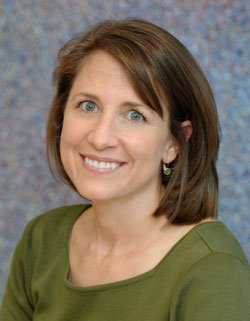
The four workshop series focused on active learning, student-centered instruction and communication strategies for students and faculty at the Middle East Technical University (METU) in Ankara.
Located in the Turkish capital, METU is an English-speaking university that emphasizes engineering and technology. It is one of the country’s most selective schools, admitting the top 1 percent of scorers on Turkey’s mandatory university entrance exam. Souza was invited to speak at the school in November as part of a new faculty career development program in which teachers expressed interest in learning more about communication in the classroom and increasing student engagement.
“It’s partly a cultural thing for students in Turkey to be more reserved and it’s partly that the students are expected to speak in a language that’s not their first language,” says Souza, an instructional communication expert who was previously Faculty Development Coordinator for the Center for Excellence in Learning and Teaching. “The other factor is that these students are millennial learners which means they are not engaged by traditional teaching practices.”
Research indicates that traditional teaching methods like lecturing and memorization are not effective for today’s super-connected, tech-savvy learners, Souza says. The result has been a gradual shift away from a teacher-centered to a learning-centered paradigm that emphasizes student engagement over rote learning.
“A lot of what I was doing was familiarizing the faculty with current research on what helps students learn,” Souza says. “We know, for instance, that after 12 minutes of lecturing, students start to lose interest so if you are going to lecture, you have to change the teaching format by showing a video clip or having students pair up to review a concept.”
Other suggestions to keep students engaged include using online tools like blogs, GoogleDocs and clickers; encouraging role-playing, debates, group work and presentations and giving students a chance to apply what they learn outside of the classroom through field research and service learning opportunities.
“What is interesting is as much as people are different because of cultural values and norms, we are similar in the way we like to learn,” Souza says. “While it might be easier to passively memorize information, deep down we all want to be active learners.”
Souza’s trip was largely funded through an educational grant from the Scientific and Technological Research Council of Turkey (TUBITAK), which supports national research and development. She will likely return to Turkey, where she plans to collaborate with METU faculty on instructional research and possibly facilitate workshops at other universities.
“I think the most empowering thing for me was to see the faculty there embrace the learning paradigm so well,” she says. Students also seemed to embrace active learning strategies. In her final workshop, which was the only one with METU students, Souza was surprised at the level of student participation. “During the workshop, the students were raising their hands and eager to participate,” she says. “It was wonderful to see.”